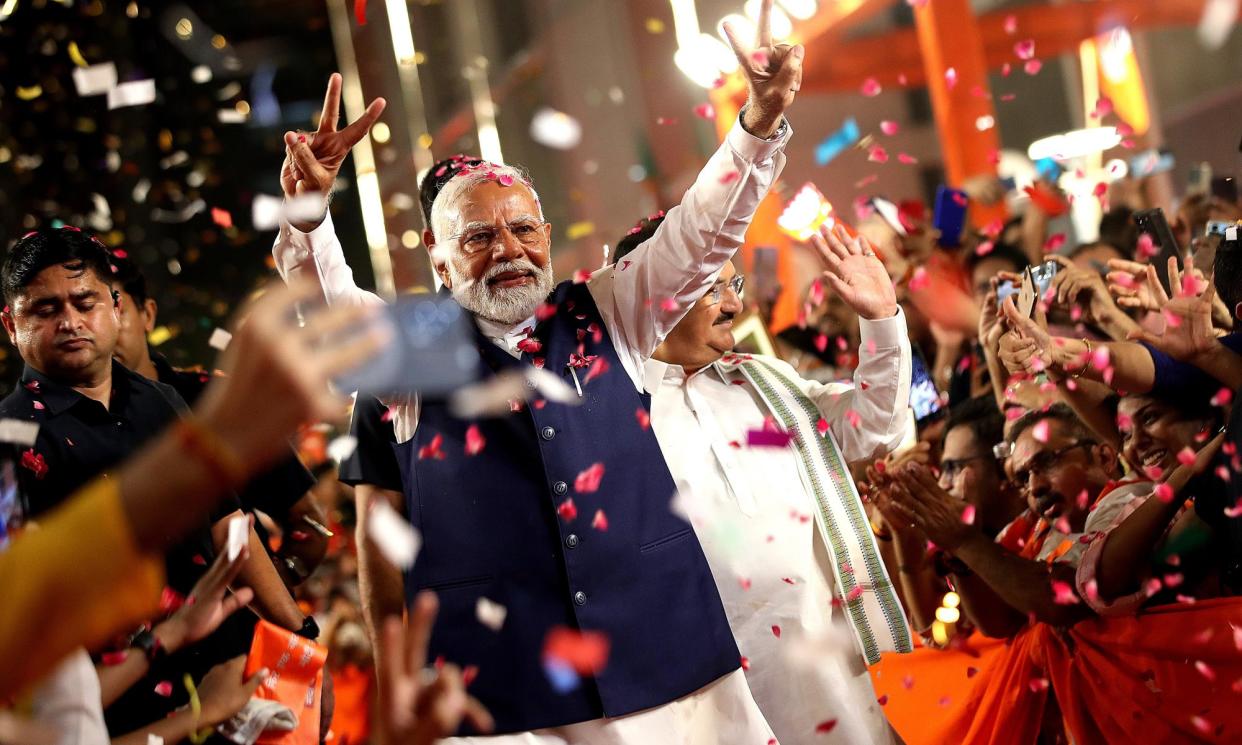Narendra Modi loses aura of invincibility as predicted landslide fails to materialise

India’s elections may return Narendra Modi to power for a third term but Tuesday’s results did not have the flavour of victory for the strongman prime minister.
Indeed, as the early counts of the votes began to roll in, it was clear this was going to be one of the most humbling moments for Modi and his Bharatiya Janata party (BJP) in over a decade.
The BJP went into this election, which began way back in April, with a confident swagger and the slogan “ab ki baar, 400 paar”, a target to win 400 seats – more than two-thirds of parliament, a feat only achieved once before. Modi’s return to power, with the same if not stronger majority, was referred to by analysts and pundits as almost an inevitability, given the carefully curated cult of personality that has built up around the leader and his centralisation of power over the past decade. As late as this past weekend, exit polls projected a BJP landslide and tens of thousands of ladoos [Indian sweets], were prepared in anticipation of victory parties across the country.
Yet that sweeping majority has not materialised, and instead a more complicated and diverse picture of India’s political landscape appeared. The BJP as a singular party looks set to lose over 60 seats, bringing its predicted total down to about 240 – not enough to form a majority on its own and making it dependent on its political alliance partners for the first time.
While the BJP’s alliance as a whole has likely won just under 300 seats, enough to form a majority government under Modi, it is with a far more weakened mandate than ever before. Many of its political partners have a far less hardline Hindu nationalist agenda than the BJP and several court support from Muslim voters.
It is likely to make it far harder for Modi to move forward with many of his more radical Hindu-first policies, particularly involving citizenship registration and laws accused of directly discriminating against Muslims. There is also now little chance of the BJP having the parliamentary votes needed to change India’s secular constitution, which had been a potent fear among many opponents.
Michael Kugelman, director of the Wilson Center’s South Asia Institute, described the results as “one of its biggest political blows for the BJP over the decade that it’s been in power”.
“Modi is still clearly a very popular political leader but he is no longer the politically invincible figure that many had assumed he was,” said Kugelman. “The question moving forward is: how will this new reality impact his governance and his way of going about things? Will he be a chastened leader and will he decide to scale back some of his ambitions?”
The results were a surprisingly sweet outcome for India’s battered and bruised political opposition, particularly the BJP’s main rival, Indian National Congress, who many pundits and analysts had written off prior to the polls as too weak and disorganised to compete with the might of Modi and his Hindu nationalist majoritarian politics.
The unwieldy coalition of two dozen opposition parties, who referred to themselves under the acronym INDIA, were not natural ideological bedfellows and came together late in the day simply to oust Modi. But after initial ego clashes, they proved more resilient and politically savvy than many gave them credit for.
Though several of the parties alleged sustained attacks by the BJP, opposition campaigns managed to capture widespread frustrations among the masses – particularly in poorer rural areas – at chronic unemployment, low wages and high inflation.
While Modi sought to distract from these issues with increasingly polarised messaging seeking to play on Hindu-Muslim divisions, it appeared that his government’s failure to create quality jobs, particularly for the vast youth population, was not an easy thing for voters to ignore – not least as Modi has long staked his political success on India’s economic growth story.
Nowhere was this picture more stark than in the state of Uttar Pradesh, which delivered one of the biggest shocks of all to the BJP. Home to more than 240 million people, India’s most populous and politically important statehas been seen as a BJP bastion over the past decade, led by one of the party’s most hardline figures, the radical monk Yogi Adityanath.
Yet it was here that the BJP suffered the most high-profile losses, including Ayodhya, the city where just a few months ago Modi inaugurated the newly built Ram temple – erected on the site of a demolished mosque – that many in the BJP had believed would help deliver them a resounding victory.
Returning for a historic third term in power – a feat only achieved before by India’s first prime minister, Jawaharlal Nehru – Modi is likely to face a very different political reality from the one he has been used to, and now faces a galvanised and more powerful opposition.
“For over two decades, Modi always had a very large majority to carry out his agenda without consultation,” said Subir Sinha, director of the Soas South Asia institute. “But now, Modi’s hands will likely be tied by coalition partners and it will be much harder to push through his big ticket reforms. It will be a rocky road for him ahead.”
An air of despondency greeted the results across India’s mainstream media, widely acknowledged to have been brought under the thumb of the government. But others said the results heralded a new political dawn for India.
Pratap Bhanu Mehta, an academic and columnist for the Indian Express, described the election as “a wondrous moment. The air of despondency, the suffocating shadow of authoritarianism, and the nauseous winds of communalism have, at least for the moment, lifted”.

 Yahoo News
Yahoo News 
